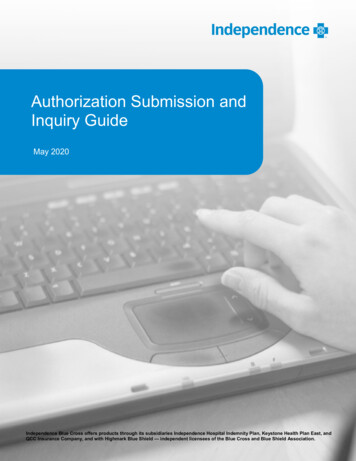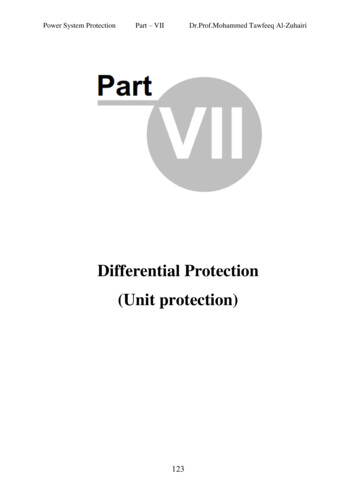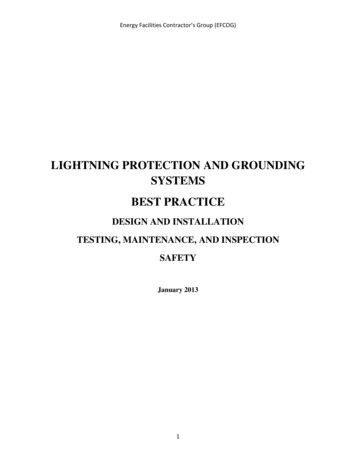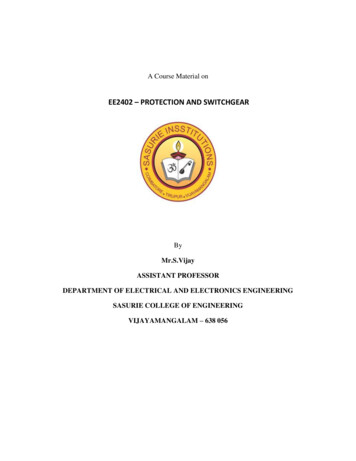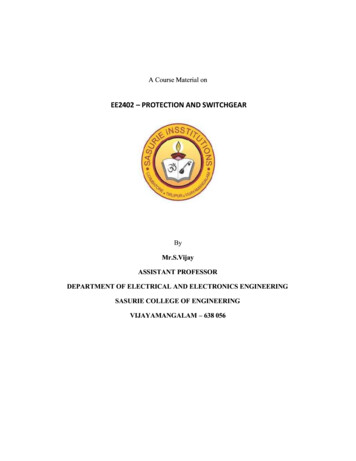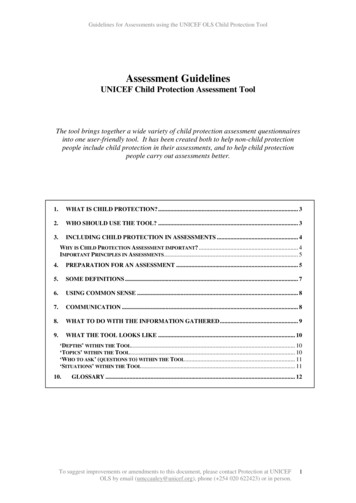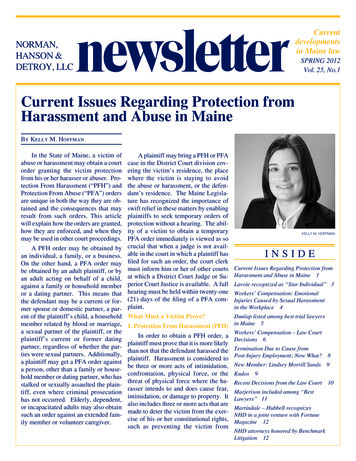
Transcription
Currentdevelopmentsin Maine lawNorman,Hanson &Detroy, LLCSPRING 2012Vol. 25, No.1Current Issues Regarding Protection fromHarassment and Abuse in MaineBy Kelly M. HoffmanIn the State of Maine, a victim ofabuse or harassment may obtain a courtorder granting the victim protectionfrom his or her harasser or abuser. Protection From Harassment (“PFH”) andProtection From Abuse (“PFA”) ordersare unique in both the way they are obtained and the consequences that mayresult from such orders. This articlewill explain how the orders are granted,how they are enforced, and when theymay be used in other court proceedings.A PFH order may be obtained byan individual, a family, or a business.On the other hand, a PFA order maybe obtained by an adult plaintiff, or byan adult acting on behalf of a child,against a family or household memberor a dating partner. This means thatthe defendant may be a current or former spouse or domestic partner, a parent of the plaintiff’s child, a householdmember related by blood or marriage,a sexual partner of the plaintiff, or theplaintiff’s current or former datingpartner, regardless of whether the parties were sexual partners. Additionally,a plaintiff may get a PFA order againsta person, other than a family or household member or dating partner, who hasstalked or sexually assaulted the plaintiff, even where criminal prosecutionhas not occurred. Elderly, dependent,or incapacitated adults may also obtainsuch an order against an extended family member or volunteer caregiver.A plaintiff may bring a PFH or PFAcase in the District Court division covering the victim’s residence, the placewhere the victim is staying to avoidthe abuse or harassment, or the defendant’s residence. The Maine Legislature has recognized the importance ofswift relief in these matters by enablingplaintiffs to seek temporary orders ofprotection without a hearing. The ability of a victim to obtain a temporaryPFA order immediately is viewed as socrucial that when a judge is not available in the court in which a plaintiff hasfiled for such an order, the court clerkmust inform him or her of other courtsat which a District Court Judge or Superior Court Justice is available. A fullhearing must be held within twenty-one(21) days of the filing of a PFA complaint.Kelly M. HoffmanINSIDECurrent Issues Regarding Protection fromHarassment and Abuse in Maine 1Lavoie recognized as “Star Individual” 3Workers’ Compensation: EmotionalInjuries Caused by Sexual Harassmentin the Workplace 4Dunlap listed among best trial lawyersWhat Must a Victim Prove?1. Protection From Harassment (PFH) in Maine 5In order to obtain a PFH order, aplaintiff must prove that it is more likelythan not that the defendant harassed theplaintiff. Harassment is considered tobe three or more acts of intimidation,confrontation, physical force, or thethreat of physical force where the harasser intends to and does cause fear,intimidation, or damage to property. Italso includes three or more acts that aremade to deter the victim from the exercise of his or her constitutional rights,such as preventing the victim fromWorkers’ Compensation – Law CourtDecisions 6Termination Due to Cause fromPost-Injury Employment; Now What?8New Member: Lindsey Morrill Sands9Kudos9Recent Decisions from the Law CourtMarjerison included among “BestLawyers” 11Martindale – Hubbell recognizesNHD in a joint venture with FortuneMagazine 12NHD attorneys honored by BenchmarkLitigation 1210
pursuing his or her ordinary activities.Additionally, a lone act that would constitute certain criminal violations, suchas harassment, interference with civilor constitutional rights, assault, sexualassault, criminal threatening, terrorizing, stalking, kidnapping, violation ofprivacy, arson, or criminal mischief isdeemed harassment. It is not necessarythat the defendant be charged with orconvicted of these crimes in order for acourt to find that harassment occurred.repeatedly and without cause followingthe plaintiff or being near the plaintiff’shome, school, or business. A victimmust prove only one such act to establish abuse. Prior to a hearing, the courtmay issue a temporary order where theplaintiff’s complaint establishes an immediate and present danger of abuse.Before a judge acts to deny a requestfor a temporary PFA order, the judgemust first allow the plaintiff to explainwhy he or she is seeking an order.Prior to a hearing on a PFH matter,a court may enter a temporary order ofprotection if a plaintiff demonstrates inthe complaint that the plaintiff or his orher employees may be in “immediateand present danger” of physical abuseor extreme emotional distress or that theplaintiff’s business property is in immediate and present danger of sufferingsubstantial damage by the defendant.The plaintiff must provide sufficientinformation in the complaint to substantiate the harassment in order for atemporary PFH order to be granted, butit is not necessary for the plaintiff tohave sought law enforcement help orinformed the defendant that he or sheis seeking a temporary order.What Relief is Available to Victims?2. Protection From AbuseUnlike harassment cases, PFAcases generally require a special relationship between the parties. However,sexual assault and stalking victims neednot demonstrate the family, household,dating, or caregiving relationship between the parties, as described above,to get a PFA order. PFA orders areissued when a plaintiff demonstratesthat it was more likely than not that thedefendant abused the plaintiff. Abuseis defined broadly in this context. Itincludes: attempting to cause or causing injury or unwanted physical contact; sexual assault; attempting to placeor placing a plaintiff in fear of injury;threatening, intimidating, or forcing aplaintiff to engage in or abstain fromlawful conduct; substantially restricting a plaintiff’s movements; threatening to commit or committing a violentcrime against a person and thus placingthe plaintiff in fear of the crime; and2Norman, Hanson & DeTroy Newsletter / Spring 2012Even before the defendant in a PFHcase has any opportunity to be heard,the court may issue a temporary orderforbidding the defendant from imposing restraint on the plaintiff’s freedom,harassing the plaintiff, entering theplaintiff’s property, taking or damagingthe plaintiff’s property, following theplaintiff, unreasonably being near theplaintiff’s home, school, or business,and having any contact with the plaintiff. This same relief also is availablein a final order. The court may issue aPFH order, generally effective for upto one (1) year, after either a hearing inwhich the court finds that the defendanthas harassed the plaintiff or if the parties agree to an order, generally withouta finding of harassment. The order mayalso require that the defendant pay theplaintiff compensation for losses suffered or attorneys’ fees incurred due tothe harassment.On the other hand, a PFA ordermay provide even more wide-rangingrelief to a victim. A temporary PFAorder may forbid the defendant fromengaging in the same activities as maybe included in a temporary PFH order.Additionally, a defendant specificallymay be banned from entering his or herown residence. Also, the order mayrelate to parental rights and responsibilities of a child(ren). Further, thecourt may order in a temporary orderthat the defendant not possess firearmsor other dangerous weapons if the complaint shows that the abuse involvedweapons, the defendant has injured theplaintiff, the abuse occurred in public,the defendant has violated past orders,or the abuse was of a certain heightenednature. When the court issues such anorder, the defendant must relinquish hisor her firearms or specified weapons tolaw enforcement within twenty-four(24) hours or less.After a hearing demonstratingabuse, or agreement of the parties toa consented order, including a consentagreement without a finding of abuse,the court may issue an order providingany of the relief available to a plaintiffin a temporary PFA order. Additionally, a final order may include an awardof parental rights and responsibilities,rights of contact, spousal support, orchild support. The order also may grantsole possession of a jointly owned orleased residence to one person, dividethe parties’ personal property, andNorman, Hanson & Detroy, LLC award custody of pets. Importantly,the order may require the defendant toreceive counseling. It also can terminate any life insurance policy held byis published quarterly to inform you of recentthe defendant in which plaintiff is thedevelopments in the law, particularly Maine law, andto address current topics of discussion in your daily insured. Finally, a PFA order may albusiness. These articles should not be construed as locate payment of plaintiff’s losses orlegal advice for a specific case. If you wish a copyof a court decision or statute mentioned in this issue, attorneys’ fees to the defendant. PFAplease e-mail, write or telephone us.orders generally are set for a fixed period of two (2) years or less.Stephen W. Moriarty, EditorLorri A. Hall, Managing EditorChanges to OrdersNorman, Hanson & DeTroy, LLCP.O. Box 4600, Portland, ME 04112Telephone (207) 774-7000FAX (207) 775-0806E-mail address: 1stinitiallastname@nhdlaw.comWebsite: www.nhdlaw.comCopyright 2012 by Norman, Hanson & DeTroy, LLCA defendant may seek to dissolve atemporary PFH or PFA order prior to afull hearing. The defendant must givethe plaintiff merely two (2) days’ notice of a hearing on such a matter. Ei-
ther party may move to modify a finalPFA order. Prior to the expiration of aPFH or a PFA order, a plaintiff may filea motion for extension of an order and,upon hearing, the court may extend theorder.Consequences of Ordersthe use of direct mediation between the While this is not a new phenomenon, itparties in other court cases.is increasingly part of the public conMoreover, the courts take domes- sciousness. Recent high profile murtic violence seriously, especially as re- der-suicides and Governor LePage’sgards its impact on children. In fact, in new public service announcement havedetermining parental rights and respon- highlighted the problem. In her Febsibilities of a minor child, two of the ruary State of the Judiciary speech,factors considered by the court are the Maine Supreme Court Chief Justiceexistence of domestic abuse between Saufley called for renewed efforts tothe parents and child abuse. Domestic reduce domestic violence. Specifically,abuse may be demonstrated by a par- she announced a policy change requirent in a family matters case through the ing bail commissioners not to set bailexistence of a PFA order. However, in domestic violence-related cases unPFA orders are sometimes sought by less they have reviewed the defendant’sconfused, desperate, or ill-meaning criminal history. Currently, proposedparents, either for themselves or on be- legislation in Maine would make thathalf of their children, when they are in policy law and also would require thatconflict with the other parent. Tempo- bail in domestic violence cases be derary PFA orders can provide immediate termined only by judges, rather thanrelief to a parent trying to obtain sole bail commissioners.It is notable that the court may notissue a mutual PFA order. This mandate makes clear that it is the responsibility of the defendant to comply withthe provisions of the order, especiallyas to contact with the plaintiff. For example, a PFA defendant who is shopping and sees the plaintiff must leavethe store immediately. Failure to doso could be deemed a violation of anorder, even if the defendant was in thestore before the plaintiff arrived. Violation of a PFA order by a defendantmay be treated as contempt, a misde- rights to a child. Yet, the misuse of themeanor crime, or a felony, depending PFA complaint process where abusedoes not truly exist is prima facie evion the conduct involved.dence that the parent seeking the orderPFH and PFA matters often overis unwilling to cooperate with the otherlap with criminal and domestic relaparent of the child. This factor is to betions cases. PFH and PFA defendantsconsidered by the court in determiningshould be wary of testifying in thosethe best interests of the child in a parenhearings where the conduct at issuetal rights or divorce action.could result in criminal charges. Adefendant’s freely provided testimony Protection Orders and Domesticin a protection hearing could later be Violenceused in a prosecution of the defendantAlthough Maine’s homicide rate isfor criminal conduct. The existence of relatively low, half of the murders ina protection order generally prevents Maine are related to domestic violence.The present focus on domesticviolence may cause the courts, law enforcement, and the general public tolook at protection orders, particularlyPFA orders, more seriously. The trendmay be that protection orders are nowgiven more traction in collateral proceedings. Victims should be aware ofthis tool and defendants should be evermore wary of casually entering intoconsent agreements.For more information about protection orders, Kelly Hoffman may bereached at 774-7000.Lavoie recognized as“Star Individual”Chambers & Partners has recognized Mark Lavoieas the only “Star Individual” in Maine in the areas ofMedical Malpractice and Insurance.Chambers also recognized NHD as among the top7 law firms in the state, and singled out Peter DeTroy,Ted Kirchner, Russ Pierce, Mark Lavoie, Jim Poliquin,Jonathan Brogan, Emily Bloch, and Chris Taintor forpersonal achievement and recognition.Mark G. LavoieNorman, Hanson & DeTroy Newsletter / Spring 20123
Workers’ Compensation: Emotional Injuries Causedby Sexual Harassment in the WorkplaceBy Katlyn M. DavidsonDealing with sexual harassmentin the workplace and how to manageemployees when harassment occursare surely subjects that have been thefocus of great attention and discussionby employers over the years. However, when an employee alleges thathe or she sustained an injury due tosexual harassment and seeks workers’compensation benefits for that injury,there is much less authority and guidance as to how to defend or managethese claims in the workers’ compensation arena. The Law Court decisionof Knox v. Combined Insurance Company of America, 542 A.2d 363 (Me.1988) makes it clear that, as a matter oflaw, injuries resulting from sexual assaults or sexual harassment fall withinthe scope of the Workers’ Compensation Act. In reaching its decision,the Law Court explained: “We see noreason to draw a distinction betweensexual assaults and non-sexual assaultsfor purposes of coverage under theAct . . . Like other assaults, sexual assaults constitute a violent invasion ofa person’s bodily integrity, and underthe right set of facts, mental or physical injuries from a sexual assault couldbe compensable injuries under the Act.Likewise, injuries resulting from actsof sexual harassment are not excludedfrom the Act’s coverage solely becauseof the sexual nature of the harassment.”However, the Knox decision does notmean that such injuries are automatically compensable; a claimant muststill establish a sufficient relationshipbetween the injury and the employment. In other words, the sexual assaultor sexual harassment must arise out ofand occur in the course of employmentin order to be compensable.insurers should look out for when facedwith a workers’ compensation claimcaused by sexual harassment, is the underlying reason or origin of the harassment. Is the harassment motivated by apersonal dispute between the employeeand the harasser? Did the harasser havea personal motive or animus against theinjured employee in carrying out theharassing behavior?While there does not appear to belegal precedent in Maine that squarelyaddresses this issue, some other jurisdictions have had the opportunity todo so and have found that an injury resulting from sexual harassment in theworkplace does not “arise out of” employment when the harassment is due toa personal motive of the harasser. Forexample, in the decision of Andersonv. Save-A-Lot, LTD, 989 S.W. 2d 277(Tenn. 1999), the Tennessee SupremeCourt considered for the first timewhether an employee who was sexuallyharassed by a supervisor in the courseof her employment could recoverworkers’ compensation benefits for heremotional injuries. In Anderson, theemployee testified that her supervisorroutinely followed her around the store,made lewd gestures and remarks toher, including sexual comments abouther body, requested that she engage insexual relations with him, and accusedthe employee of having sexual relationswith other co-workers. As a result ofthe harassing behavior, the employeedeveloped post-traumatic stress disorder and depression. The TennesseeSupreme Court denied the employee’sclaim on the basis that the injury didnot arise out of her employment, explaining: “On one hand, it is logical toconstrue [the harasser’s] purported acAn important consideration and tivity as seeking to further a personalpotential defense that employers and perverse sexual desire. It is equally log4Norman, Hanson & DeTroy Newsletter / Spring 2012Katlyn M. Davidsonical to interpret [the harasser’s] conductas being motivated by a demented animosity against [the employee] in whichhe seeks to control and humiliate her.Under any interpretation, we find that itwould be unreasonable to characterize[the harasser’s] motivation as anythingother than ‘purely personal in nature’and not related to furthering the business of the employer. [The employee]has not made any allegation suggestingthat [the harasser] was provoked to actin the best interest of [the employer] . . .”Additionally, many jurisdictionsthat have addressed the compensabilityof emotional injuries caused by sexualharassment find the situation analogous to injuries caused by assault andoften rely on the established standardsregarding assault in the workplace. Inthe context of assaults arising from personal or private matters, the prominenttreatise Larson’s Workers’ Compensation Law states the following: “Whenthe animosity or dispute that culminates in an assault is imported into theemployment from claimant’s domesticor private life, and is not exacerbatedby the employment, the assault doesnot arise out of the employment underany test.” 1 Lex K. Larson, Larson’sWorkers’ Compensation Law § 8.02(Matthew Bender, Rev. Ed. 2011).
In Maine, there is significant legalprecedent regarding privately motivated assaults that suggests that aHearing Officer might reach a similaroutcome as the Tennessee decisionof Anderson v. Save-A-Lot when confronted with the claim of a mental injury caused by sexual harassment thatis privately motivated. For example,the Law Court decision of Johnson v.Drummond, Woodsum, Plimpton &MacMahon, 490 A.2d 676 (Me. 1985),addressed the situation of a privatelymotivated assault occurring in theworkplace. In Johnson, the estrangedhusband of the employee had been trying to contact her at her workplace. Thehusband had made several previous attempts in person and by telephone andwas continually refused by the employee. On the date in question, the employee’s estranged husband appeared atthe employer’s office and the employeemet him in the lobby at which time theestranged husband shot the employeeand himself. The employee’s claim forworkers’ compensation benefits wasdenied by the former Workers’ Compensation Commissioner, reasoningthat the assault did not occur becausethe employee was at work. The LawCourt affirmed the decision, stating thatthe assault and injury were “a consequence of her personal life in generaland [were] unrelated to her work activity.” The Law Court further explainedthat the acts giving rise to the injurywere imported from the employee’sprivate life and were not exacerbatedby the employment.Similarly, in a recent decision fromthe Workers’ Compensation Board,Walker v. Siano’s Pizzeria, 2011 WL4796949 (Me. Work. Comp. Bd. 2011),an employee who performed part-timemaintenance work for a local restaurantoffered to help a co-worker sell her carand made efforts to find a buyer. A dispute arose between the employee andthe co-worker when the co-worker refused to pay the employee any moneyfor his efforts after having successfullyfound a buyer for the co-worker. Tensions persisted between the two andone of the owners of the restaurant,who was also the employees’ supervisor, even paid a small sum to the employee to smooth things over. A fewmonths later, the co-worker accused theemployee of tampering with her newvehicle. Then, while the employee wasworking on the outdoor seating area ofthe restaurant, an individual connectedwith the co-worker approached theemployee and an angry confrontationoccurred. The individual struck the employee, causing him to fall and injurehis right foot and ankle in the process.The Hearing Officer denied theemployee’s claim for workers’ compensation benefits, finding that the injury was not caused by the employee’semployment but rather was the result ofa private dispute. The Hearing Officerreasoned that the employer’s involvement, in attempting to pay a small sumto the employee to smooth things over,did not transform the private disputeinto an employment matter. Addition-ally, the employee attempted to arguethat the employment with Siano’s exacerbated the animosity between theemployee and the co-worker because oftheir continuing contacts. The HearingOfficer rejected this argument, findingno evidence to support the claim andalso quoted from the Larson’s treatise to support his position: “Assaultsfor private reasons do not arise out ofthe employment unless, by facilitatingan assault which would not otherwisebe made, the employment becomes acontributing factor.” 1, Lex K. Larson,Larson’s Workers’ Compensation Law,8-1 (Matthew Bender, Rev. Ed. 2011).Therefore, when an employeemakes a claim for workers’ compensation benefits based on a mental injurycaused by sexual harassment in theworkplace, it is important for employers and insurers to pay attention to theunderlying reason for the harassment.If it can be established that the harassment was conducted by the harasserbecause of a personal motivation or animus against the employee, then there isa good argument that any mental injurycaused by the harassment does not ariseout of the employee’s employment.This defense is already recognized inMaine in the context of physical injuries caused by privately motivated assaults and given this backdrop, alongwith persuasive authority from otherjurisdictions, it may be an easy leapfor a Hearing Officer to apply the samereasoning to mental injuries arising outof harassment in the workplace.Dunlap listed among besttrial lawyers in MaineMark Dunlap has been listed by the National TrialLawyers as among the top trial lawyers in the State ofMaine.Mark E. DunlapNorman, Hanson & DeTroy Newsletter / Spring 20125
WORKERS’ COMPENSATION – LAW COURTDECISIONSBy Stephen W. MoriartyRebuttal of retirement presumptiontion could be rebutted for a period oftime following retirement where an injured individual was unable to performsuitable work. Although the Courtconcluded that the hearing officer hadcorrectly found that the presumptionapplied to the claim, it held that “nothing in the statute or our decisions precludes a retired employee from havingbenefits reinstated for a discrete timeperiod when the employee proves thatduring that time period, he was incapable of performing any suitable workdue to the work injury”. Given theCourt’s clear examination of the issue,it is likely that on remand the hearingofficer will award total incapacity benefits for the period claimed.The claimant sustained a compensable injury to his back in 2004 and retired from active employment early thefollowing year. He began to receivenondisability pension benefits, therebytriggering the retirement presumptionset forth in §223. He ultimately secured part time employment in 2008,but gave up the position in the following year due to increasing back problems. Ultimately he underwent spinalfusion surgery in late 2009 and soughtbenefits for a closed period of total incapacity beginning shortly before thesurgery and ending approximately onemonth before the testimonial hearing,by which time he had reached his baseLeased employees and discriminaline status.The hearing officer denied the tion claims6claim for benefits and in responding toa Motion for Findings of Fact did notelaborate upon the basis of her decision. In requesting findings the Employee agreed that the presumptionapplied to him, but contended that hehad rebutted the presumption by showing that he had no capacity to performwork of any type during the period following his fusion surgery. In Downingv. Department of Transportation, 2012ME 5 (January 24, 2012), the Court’s“bottom line” conclusion was that thehearing officer had an affirmative dutyunder the statute to issue findings andtherefore remanded the matter to theBoard for further analysis of whetherthe claimant had successfully rebuttedthe presumption.Employee leasing agencies havebeen a prominent feature of the Maineand national economies for manyyears, and such arrangements can present unique challenges to the workers’compensation system in establishingthe responsibilities and entitlements ofthe parties. In such situations a leasingagency hires an individual and assignshim or her to work at a separate company generally known as the “clientcompany” or the “special employer”.Although some jurisdictions recognizethat both employers may be fully responsible in the workers’ compensationcontext as “joint” or “dual” employers,the Law Court recently rejected theconcept of joint liability as between aleasing agency and a client company.In examining the issue the Courtnoted that presumption may be overcome by a showing of an inability toperform any suitable work, and that ina previous decision, Pendexter v. Tilcon of Maine, Inc., 1999 ME 34, 724A.2d 618, it had held that the presump-In Doughty v. Work OpportunitiesUnlimited, 2011 ME 126, 33 A.3d 410,Work Opportunities hired the claimantand assigned him to work on a full timebasis at a Poland Spring bottling facility. While Poland Spring paid WorkOpportunities a fee for the services ofNorman, Hanson & DeTroy Newsletter / Spring 2012Stephen W. Moriartythe claimant, all income was paid byWork Opportunities. The claimantsustained an uncontested personal injury while working at Poland Spring,and immediately afterward PolandSpring refused to permit him to returnbased upon unsafe work practices. Ultimately Work Opportunities terminated the claimant following a series ofmissed medical appointments and various mis-communications.The claimant filed Petitions forAward against both businesses togetherwith Petitions to Remedy Discrimination. All matters were consolidated forhearing and the following three determinations by the Board were essentially non-controversial:1. The Petition for Award againstWork Opportunities was granted,and benefits were awarded for aclosed period of incapacity. No appeal was taken from this decision.2. The Petition for Award was deniedagainst Poland Spring, and no appeal was taken from this ruling.3. The Petition to Remedy Discrimination against Work Opportunitieswas denied. On appeal the Employee argued that he had been discriminated against by asserting aright to treat with a provider of hischoice. The hearing officer found
as a fact that the claimant was not It would be hard to envision a moreterminated on this basis, and the favorable set of factual circumstancesCourt did not disturb the hearing for the recognition of the doctrine, andtherefore at this point it may safely beofficer’s decision.The key ruling, and the central said that there can be only one responissue on appeal, was the hearing offi- sible employer for a workers’ compencer’s denial of the discrimination claim sation claim in Maine. The majorityfound that any other result would reagainst Poland Spring.quire both the actual employer and theThe hearing officer found that the special employer to pay for workers’claimant was not an employee of Po- compensation coverage, which wouldland Spring and that no contract of hire frustrate the cost-savings purposes ofexisted between the parties. Accord- the Act.ingly, the anti-discrimination remediesThe three dissenting justices arguedof §353 were not available to the claimthatthe claimant satisfied the definitionant. The hearing officer found that inof“employee”set forth in §102(11)(A)the absence of a contract of hire the clamant could not prevail in a discrimina- and therefore was an employee of Potion claim against the “client company” land Spring within the meaning of theAct. The dissentions also referencedor “special employer”.the criteria designed to distinguish emIn a sharply divided 4-3 opinion ployees from independent contractorsthe Law Court affirmed the decision of and would have found the claimantthe hearing officer on the grounds that to have been an employee of Polandthere was no employment relationship Spring either under the concept of dualwith Poland Spring. The Court found employment or in the capacity of a lentthat §353 implicitly requires an exist- employee. The dissenters found thating employment relationship, as it pro- the Act does not exclude workers asvides that discrimination claims may signed by temporary agencies from thebe brought under the Maine Human statutory definition of “employee”, andRights Act if no such relationship ex- that the possibility that both Work Opists and the protections of §353 are portunities and Poland Spring mightunavailable. The Court also noted that have to separately obtain workers’§104 immunizes an employee leasing compensation coverage was not anagency or a temporary help services issue of concern.company against civil liability as longas that company has secured workers’ Multiple injuriesIn Miller v. Spinnaker Coating,compensation coverage for its employ2011ME 79, 25 A.3d 954, the Courtees. Therefore
in Maine law SPRING 2012 Vol. 25, No.1 INSIDE Current Issues Regarding Protection from Harassment and Abuse in Maine 1 Lavoie recognized as "Star Individual" 3 Workers' Compensation: Emotional Injuries Caused by Sexual Harassment in the Workplace 4 Dunlap listed among best trial lawyers in Maine 5 Workers' Compensation - Law Court



